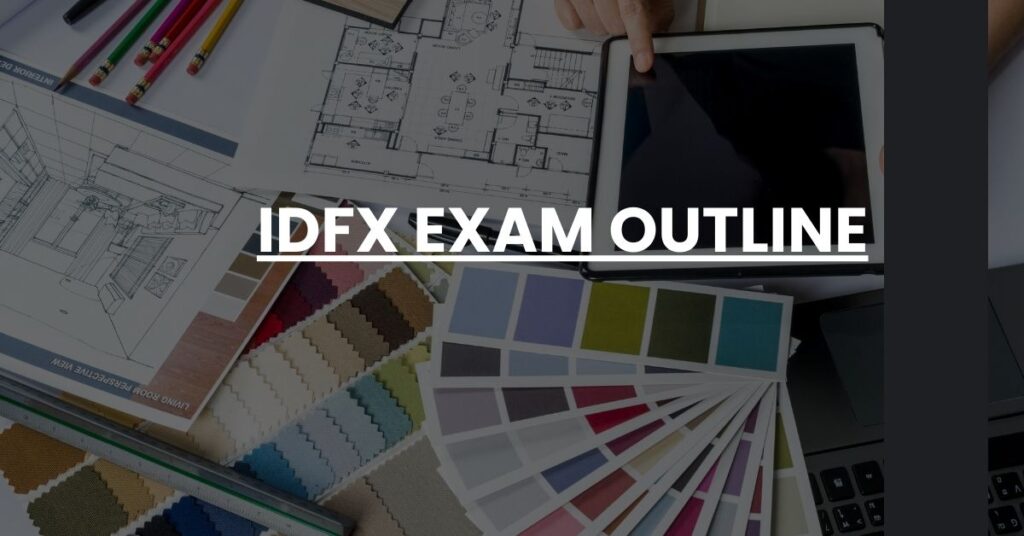Introduction
IDFX exam outline is crucial for success in professional interior design certification. This guide covers:
- Purpose and Content: Understand the essential areas of the exam.
- Eligibility Requirements: Ensure you meet the necessary criteria.
- Preparation Strategies: Access top study tips and resources.
Mastering the IDFX exam outline is key to your certification journey.
- Introduction
- Understanding the IDFX Exam
- IDFX Exam Eligibility Requirements
- IDFX Exam Format and Length
- Key Content Areas of the IDFX Exam
- Preparing for the IDFX Exam
- Study Materials and Resources
- Registration Process for the IDFX Exam
- Cost and Scheduling of the IDFX Exam
- What to Expect on Exam Day
- Scoring and Results of the IDFX Exam
- Retaking the IDFX Exam
- Frequently Asked Questions
- Conclusion
Understanding the IDFX Exam
What is the IDFX Exam?
The Interior Design Fundamentals Exam (IDFX) is a critical component of the NCIDQ certification process. It evaluates the foundational knowledge and skills of interior design professionals. Understanding the topics covered by the IDFX exam outline is crucial for those aiming to demonstrate their proficiency in the field.
Importance of the IDFX Exam
The IDFX exam holds significant value for interior designers. Passing it is a vital step toward becoming a certified interior designer. This credential demonstrates your competency and commitment to the profession. It boosts your credibility and can have a positive impact on your career opportunities.
Role in the NCIDQ Certification
The IDFX exam is the first of three exams within the NCIDQ certification process. It covers the fundamental aspects of interior design, while the other two exams (Interior Design Professional Exam (IDPX) and the Practicum Exam (PRAC)) focus on more advanced topics and practical application. By successfully passing the IDFX exam, you pave the way toward achieving full NCIDQ certification.
IDFX Exam Eligibility Requirements
Who Can Take the IDFX Exam?
The IDFX exam is accessible to a range of individuals who meet specific educational and professional prerequisites. Eligibility criteria ensure that candidates possess the necessary foundational knowledge.
Educational Requirements
To be eligible for the IDFX exam, candidates must typically have:
- A degree in interior design: Bachelor’s or Master’s degree programs in interior design are standard prerequisites.
- Work experience: Graduates still need some work experience before taking the IDPX and PRAC exams.
Prequalifying Students and New Graduates
The IDFX exam is available to recent graduates in their final year of a Bachelor’s or Master’s degree-seeking interior design program. This eases the way for students to commence the certification process before accumulating full work experience.
IDFX Exam Format and Length
Structure of the Exam
The IDFX exam is structured to comprehensively test your knowledge and understanding of interior design fundamentals:
- Length: The exam lasts 3 hours.
- Questions: It comprises 125 multiple-choice questions, of which 100 are scored and 25 are pilot questions.
Types of Questions
The multiple-choice questions may assess your grasp of various principles. You should be familiar with subjects such as:
- Design Concepts
- Building Systems
- Standards and Codes
- Human Behavior and the Designed Environment
Key Content Areas of the IDFX Exam
Core Topics Covered
The IDFX exam outline includes several vital content areas that interior designers must be proficient in to pass the exam. Here are some of the key subjects:
- Design Communication: Understanding graphing, drafting, and both freehand and CAD drawing techniques. It is essential for visual communication skills critical in interior design.
- Building Systems: Knowledge of mechanical, electrical, and structural systems within a building.
- Construction Standards: Familiarity with standard construction practices and materials.
- Human Behavior and the Designed Environment: Insight into how spaces affect human behaviors and vice versa.
Additional Focus Areas
The IDFX exam also emphasizes other significant aspects of interior design, including:
- Programming and Site Analysis: Assessing user needs and environmental conditions for appropriate design solutions.
- Professional Ethics and Practice: Understanding ethical considerations and business practices within the industry.
- Product and Material Coordination: Select and specify furniture, fixtures, and other materials.
Preparing for the IDFX Exam
Creating a Study Plan
To maximize your success on the IDFX exam, you should develop a structured study plan:
- Set a timeline: Target at least six months of preparation.
- Divide your study sessions: Focus on different content areas during each session.
- Allocate breaks: Regular breaks can help maintain your focus and prevent burnout.
Study Strategies
Several strategies can significantly boost your study efforts:
- Mock exams: Practice with sample questions and timed exams to familiarize yourself with the format and pacing.
- Review courses: Participate in workshops or online courses offered by reputable organizations to reinforce your understanding.
- Study groups: Joining a study group can provide support and enhance learning through discussion and shared resources.
Essential Tips
Here are a few practical tips to help you prepare effectively:
- Consistent study habits: study regularly instead of cramming sessions close to the exam date.
- Utilize flashcards: For key terms and concepts, flashcards can be an excellent memorization tool.
Study Materials and Resources
Recommended Books
Certain books are highly recommended to help you prepare comprehensively for the IDFX exam:
- “NCIDQ Interior Design Reference Manual”: A comprehensive resource covering all essential domains.
- “Interior Design Fundamentals”: Focuses on fundamental principles and theories.
Online Resources
Utilizing online resources can supplement your study plan:
- PPI2Pass: Offers an array of study materials specifically tailored to the IDFX exam.
- CIDQ: The official CIDQ site provides essential information on exam content, dates, and fees.
Review Courses
Participating in review courses offered by professional organizations can be beneficial:
- ASID NCIDQ Prep Course: Offers comprehensive content review and practice exams.
Make sure to leverage these resources in your preparation to ensure you cover all necessary content areas and practice adequately.
Registration Process for the IDFX Exam
Understanding how to navigate the registration process for the IDFX exam is essential for all potential candidates. This comprehensive guide will walk you through the necessary steps to ensure you are adequately prepared and registered.
Application Steps
To register for the IDFX exam, you should follow these steps:
- Verify Eligibility: Ensure you meet the educational and professional prerequisites mentioned earlier.
- Submit Your Application: Go to CIDQ’s application page and fill out the necessary information. Your application must include:
- Application Fee: The non-refundable application review fee must be paid to proceed.
Deadlines and Timelines
Adhering to the deadlines is crucial:
- Application Deadline: Typically seasonal, ensure your application is submitted well before the specified dates.
- Scheduling Window: After your application is approved, you will have a designated period to schedule your exam.
Registration Fees
Understanding the financial aspect is essential:
- Primary Fee: The standard fee for the IDFX exam.
- Rescheduling Fee: If you need to change your exam date, be aware that rescheduling might incur additional charges, especially if the change is close to the exam date.
Cost and Scheduling of the IDFX Exam
Exam Costs
Understanding the financial commitment involved can help you plan better:
- Initial Application Fee: This covers the administrative costs of processing your application.
- IDFX Exam Fee: This is the fee you’ll pay to sit the exam.
Scheduling Your Exam
Efficiently scheduling your exam involves the following:
- Approval Notification: Once your application is approved, you’ll receive instructions on how to schedule your exam.
- Selecting a Date: Choose a date within the scheduling window provided by CIDQ.
- Confirmation: Ensure you receive a confirmation email detailing your exam date, time, and location.
What to Expect on Exam Day
Preparation for Exam Day
Being well-prepared for exam day involves understanding the protocol and required materials:
- Arrival Time: Arrive at least 30 minutes before your scheduled time to allow for the check-in process.
- Identification: Bring valid, government-issued identification that matches the name on your application.
Exam Day Protocols
Following the protocols ensures a smooth exam experience:
- Check-In Process: You’ll go through a security check, which might include fingerprinting or a photo.
- Materials Allowed: Understand which materials you can bring. Typically, personal items are restricted.
Scoring and Results of the IDFX Exam
Scoring Methodology
The IDFX exam uses a scaled scoring system to ensure fairness:
- Minimum Pass Score: Generally, a scaled score of 500 is required to pass.
- Scoring Process: The scaled score is a conversion of your raw score (the number of questions answered correctly).
Receiving Your Results
After completing your exam, expect to follow this process:
- Processing Time: Typically, you’ll receive your results within a few weeks.
- Accessing Results: Results are usually available through your CIDQ account or via email notification.
Retaking the IDFX Exam
Retake Policy
If you do not pass the IDFX exam on your first attempt, understanding the retake policy is important:
- Waiting Period: There is often a specified waiting period before you can retake the exam.
- Retake Fees: Each retake will incur additional fees, which are similar to the original exam fees.
Steps to Retake
- Review Your Results: Identify areas where improvement is needed.
- Submit Retake Application: Follow the same application process for retakes.
- Prepare and Schedule: Use your previous experience to better prepare for the retake.
Frequently Asked Questions
Common Queries
Addressing common concerns provides clarity:
- Eligibility for Students and Graduates: Can students in their final year apply? Yes, if in the last year of an eligible program.
- Application Timing: When should I apply? Ideally, a few months before your target exam date.
- Study Resources: What are the best resources? Use the NCIDQ Interior Design Reference Manual for comprehensive coverage.
Conclusion
The IDFX exam outline serves as a roadmap for your certification journey in interior design. By understanding the exam’s structure, preparing effectively, and following proper registration procedures, you can approach your exam with confidence. This guide provides all the crucial information you need to navigate the process successfully and achieve your professional goals.

